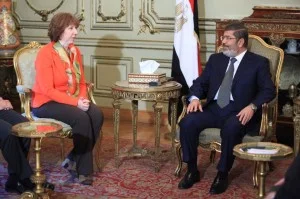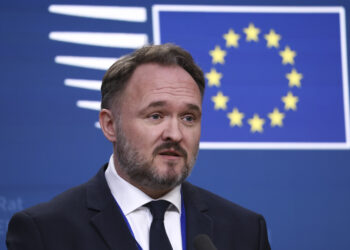
Since the army ousted the first democratically elected President of Egypt Mohammed Morsi on 4 July, there has been quite a debate, not just among foreign policy nerds, about what was or would have been the best response on part of the EU and the US. During the course of last week, the EU’s High Representative issued a number of statements urging a restraint from violence, exhorting a dialogue between the parties, condemning the violence, and calling for an inclusive political dialogue between all parties, more or less in this order. One glaring absence in these statements was the demand that Morsi and his colleagues be free from house arrest or detention – a point I will turn to later.
To be fair, the EU was engaged since the very beginning of the crisis and its Special Representative, Bernardino Leon, was in Cairo talking with all parties involved in search for a solution. To be even more fair, the EU had been warning the President and Muslim Brothers representatives, quietly and behind closed doors, that the choices made of progressively excluding most other political actors were not wise. Now, with the ambition to act as an honest broker, EU High Representative Catherine Ashton is about to travel to Cairo to see if her proven skills as mediator can be of use in Egypt.
But so far these efforts have been without consequence: the dialogue between the EU and the rising Islamist-inspired political forces which have emerged during the past year was unsuccessful. The question will be whether the inability to engage with ‘new’ political actors (one of the most important challenges for the EU after the Arab Spring) was more due to these actors being totally uninterested in what the EU has to say or to the EU being unable to find means for engagement.
There is one question Lady Ashton should bear in mind: why should the Muslim Brothers trust the EU when it did not call for Morse’s release from house arrest?
In the meantime, in Brussels and Washington the big debate was whether the events in Cairo were a coup or not and whether the EU and the US should call it by that name. it is not just a semantic debate. In fact, there is no doubt that the events amounted to a coup.
Until last week, I had been pondering whether refraining from calling the ousting of Morsi a coup d’état might be a smart tactical move. By keeping the door open for dialogue with the army, the EU and the US may be more able to influence the army – clearly the king maker– to return to Egypt’s fragile democratic path, call for very early elections, and restart a process of dialogue with all parties.
But now it is clear that member states are, quite simply, divided. This should come as no surprise, given the history of EU relations with that part of the world. Member states agree on all the points made by Ashton last week: no violence, inclusive and political dialogue with all parties, early elections. They even call for the release of all those detained for political reason. But they fail to call these people by name. They fail to call for the release of Morsi.
Why? Unfortunately, the interpretation which is closer to reality is the most crude one. Forget tactics and means for dialogue: there are quite a few member states which do not like Islamist parties, do not believe that they can be truly democratic (granted, the Muslim Brothers’ track record supports this) and are nostalgic for the good old days when army, with Mubarak, would make sure that these trouble makers would not get in the way of trade and regional security.
Yet again, member states are divided, yet again simplistic interpretations of the region get in the way of more long-term democratic aspirations. Good luck Lady Ashton!
Rosa Balfour




![Enrico Letta [Bruxelles, 3 aprile 2025]](https://www.eunews.it/wp-content/uploads/2025/04/letta-350x250.png)






